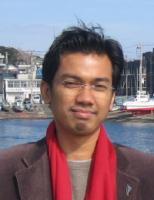Amir, Sulfikar | Singapore

Sulfikar Amir is an assistant professor at the Division of Sociology Nanyang Technological University, Singapore. He completed a doctoral degree in Science and Technology Studies at Rensselaer Polytechnic Institute where he wrote a dissertation on technological nationalism in the New Order Indonesia. He has taught STS courses in Rensselaer and in Institut Teknologi Bandung, Indonesia before joining NTU.
He was a former visiting research fellow at the Institute of Southeast Asian Studies in Singapore and at the East-West Center in Washington where he conducted a research on nuclear politics in post-Suharto Indonesia. His research interests include social studies of science, sociology of risk, technological politics, alternative energy, development and social change, democracy, and Southeast Asian Studies. Currently he is working on a research project that examines the nuclear politics in Southeast Asia, specifically in Indonesia and Thailand.
Project at IAS-STS: Nuclear Risk and Democracy in Southeast Asia
After being idle for a decade, nuclear power is increasingly gaining popularity among Southeast Asian states. The unprecedented rise of oil prices in international markets following the Iraq War, the global concern of climate change, and technological breakthroughs in the safety system of nuclear reactor design are among the crucial factors that render nuclear power a viable, strategic option for Southeast Asian countries to secure their energy supply. The growing desire for nuclear power in Southeast Asia has been accompanied by a variety of public responses in this region. These responses are by and large determined by democratic conditions in the respective country.
In Indonesia, for example, the state’s plan to implement the nuclear energy program is being challenged by a strong anti-nuclear alliance constituted by various civil society groups demanding the current government to cut off the nuclear option from the national energy policy. Likewise, Thailand’s anti-nuclear movements are fervently showing their disapproval, pushing the government to rethink the nuclear policy. Focused upon the emergence of the nuclear regime in Southeast Asia, this presentation will discuss how the future presence of nuclear power are responded in two emerging democracies, Indonesia and Thailand. It highlights several issues regarding public perception of nuclear risk and the demand to democratize energy systems.
Selected Publications
"Nuclear Revival in Post-Suharto Indonesia". Asian Survey (forthcoming)
"The Engineers versus the Economists: The Disunity of Technocracy in Indonesian Development." Bulletin of Science, Technology, and Society. 2008 28(4): 316-323.
"Nationalist Rhetoric and Technological Development: the Aircraft Industry in New Order Indonesia" Technology in Society. 2007 27(3): 283-293
